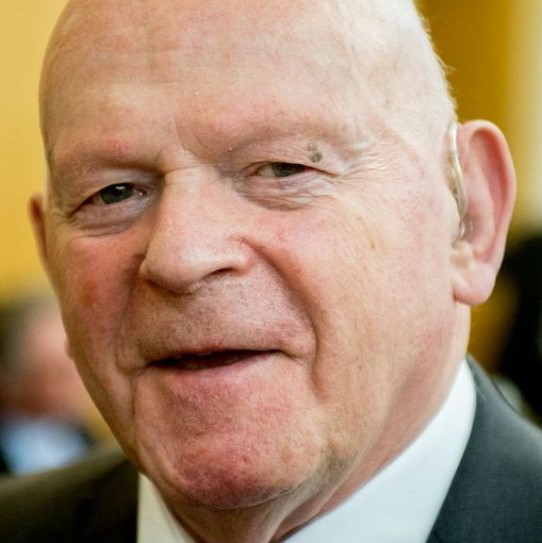
World

Ben Helfgott: From concentration camp to knighthood
JORDAN MOSHE
Before Helfgott turned 15, his father, mother, and sister were shot by the Nazis. He went from a ghetto to several concentration camps, transported in cattle cars.
And yet, 11 years after being liberated, he participated in the Olympic Games as a weightlifter, representing his new home, Britain.
This month, his life and work were recognised with a knighthood, and he will henceforth be known as Sir Ben Helfgott.
“I couldn’t believe it,” Helfgott said about the knighthood. “I’m choked. Obviously, I’m very pleased. All my life, I’ve worked to educate about the Holocaust and I will continue to do so.”
The achievement is deserving of celebration in South African as well. Helfgott’s wife, Arza, was born in Zimbabwe, and their son is married to South African-born Thea Kilov. Helfgott is one of a group of prominent Jews recognised this year for their contributions, including historian Simon Schama, philanthropist Lloyd Dorfman, and MP Louise Ellman.
Unlike other honours, the British Empire Medal is not awarded by the Queen or Prince of Wales, or at the palace, but by Lord-Lieutenants, who are the representatives of the Crown for each county in the United Kingdom, as it is seen as more of a community award. Although scrapped in 1993, the award was revived by David Cameron in 2013 to recognise “the dedication and hard work so many provide to their communities” and is awarded to “ordinary people”.
However, Helfgott is no ordinary person. Ben Helfgott was born in Piotrków, Poland, and was 10 years old when Germany invaded the country in 1939. Helfgott and his father, Moishe, escaped the initial roundups of Jews, and found work in a local factory. In December 1942, 500 people, including Helfgott’s mother Sara, and sister Lucia, were moved to nearby woods and shot. In the summer of 1944, Helfgott’s surviving sister Mala was taken to the Ravensbrück Women’s camp and he and his father stayed together until they arrived at Buchenwald. “It was a terrible place. All we had to eat was soup that smelled like urine, and a crust of bread,” he says. Helfgott was subsequently sent to other camps, while his father was eventually rounded up for one of the death marches and was shot trying to escape.
After the liberation of Theresienstadt, the last in his long chain of camps, one of Helfgott’s fellow inmates said he was joining a group going to England. Helfgott joined him and arrived in Britain at 15 in 1945, along with 750 other children flown in by the Royal Air Force to be settled in hostels run by Jewish organisations. The new Labour government had agreed that 1 000 youngsters, nearly all concentration camp survivors, could be granted entry permits. After initially being lodged in a hostel near Windermere, he went to London, gained a place at Plaistow County Grammar School, and passed his higher school certificate, just a couple of years after he had arrived in Britain.
His passion for sport led him to join the Primrose Club for young survivors, run by German athlete Paul Mayer, who had been hoping for a place in the 1936 Berlin Olympics until the Nazis banned him because he was Jewish. Taking a particular interest in weightlifting, Helfgott competed in a series of competitions and became national lightweight champion in the early 50s. In Melbourne in 1956, and in Rome four years later, he was captain of the competing team. Although he won no medals in either event, he subsequently came away with a gold medal at the Maccabiah Games in Israel, three consecutive times.
Helfgott went on to become a clothing manufacturer and a prominent member of the Jewish community, helping to form the Holocaust Survivors ’45 Aid Society, serving on the Board of Deputies and acting as a trustee of the Holocaust Education Trust for 30 years. It was for his tireless efforts that this Polish-born, former champion weightlifter was included in the Queen’s birthday honours for his work on Holocaust education this month.
According to Jewish News, a Cabinet Office spokeswoman said: “Ben has worked tirelessly, over many decades, to encourage community cohesion and combat intolerance and hatred. He has used his public profile as a Holocaust survivor to ensure that Holocaust commemoration has remained on the national agenda.”
Said Karen Pollock, the Chief Executive of the Holocaust Educational Trust, “This is marvellous news and so deserved. Soon after he was liberated from the concentration camps, Ben knew that the story of what happened to him, his family and the six million Jews murdered by the Nazis must be told. He helped shape Holocaust education in the UK, campaigned for a memorial in London, and for a national day to remember the Holocaust.”





Harvey H. Shenker
June 29, 2018 at 7:31 pm
‘If it were to become possible, Ben should be cloned.
I came across this present site via Desert Island Discs.
Ben was my weightlifting trainer (I guess, but am no longer certain), way back in the 1950’s.
I wish him all he wishes for himself.
A truly great man.
‘